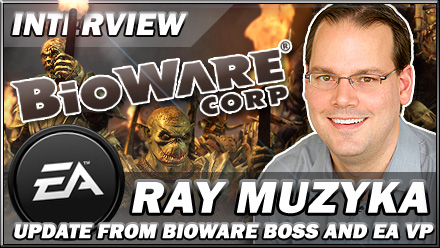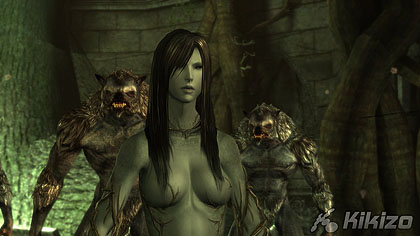Interview: BioWare CEO & EA VP Ray Muzyka
The BioWare boss and EA VP discusses Dragon Age: Origins, Star Wars: The Old Republic, the Mass Effect trilogy, and whether EA's serious focus on quality is actually paying off.

Page: 1 2
It's really not that long since we last met with Dr. Raymond A. Muzyka, in a fairly lengthy interview that looked at the history of BioWare and the impressive story of how the revered studio came to be. It only briefly touched on the EA-owned developer's upcoming fantasy game, Dragon Age: Origins, which Muzyka described as "the spiritual successor to Baldur's Gate, and the bread and butter for what BioWare fans are expecting".
In today's catch up with the BioWare CEO, who's also an Electronic Arts Vice President, we look at Dragon Age a little more, as well as chat through the multitude of other stuff they have coming up.
Kikizo: You've built a brand new engine for Dragon Age: Origins that looks pretty impressive. Is there potential for you to expand the business - whether for BioWare as a unit of EA, or thinking of RenderWare as the middleware unit within EA - by licensing out technology?
Muzyka: We could, yeah - it's something we considered as an alternative approach - I mean our main focus is as a developer; we're not an engine license house per se. But we have done that - we built the Infinity Engine and we licensed that out for a number of games - Baldur's Gate we built ourselves; Icewind Dale and Planescape Torment were by other people; the Aurora Engine from Neverwinter Nights - CD Projekt licensed that for The Witcher; the Odyssey Engine we developed for Knights of the Old Republic was licensed by LucasArts for Knights of the Old Republic II. So yeah, a lot of the technology we've developed over the years has been licensed out, but we're pretty selective in how we approach that. We want good partners, who are going to do a really good job, and all those products I think are generally seen as positive, high quality games - and we're associated with them, too. So we don't want to license engines for the sake of licensing engines; we want to license engines to make great games. We're going to make great games with our own technology, but we also want partners we work with to be able to do that, too.
Kikizo: Obviously you're a VP of EA these days. Can you give us an update on how you feel the recently introduced John Riccitiello strategy is working - the focus on higher quality games, on taking risks with new IP - there were some risky titles last year that were put out.
Muzyka: I think the strategy is working pretty well. It's a good strategy in the sense that it can lead to higher returns, because the fans appreciate that you're investing in quality, and they appreciate that you're investing in innovation. They're willing to support that kind of thing long-term, so I think John has the right vision in that sense.
Kikizo: It's been interesting to see how the gamer perception of EA has dramatically changed over the last few years as a result. But some point to the fact that the share price isn't what it was - can you correlate the two things? Do the risks scare the shareholders?
Muzyka: Well I think there have been some challenging circumstances in the broader economy too, though.
Kikizo: You're working on Star Wars: The Old Republic - how it this project going?
Muzyka: It's going really well. Our Austin team's working on it with LucasArts, a great partner, in the Star Wars universe. It's going to be an MMO which has the best-of-breed features from a lot of the other MMOs - exploration, progression, customisation and good combat - but also, story, in a multiplayer setting - so strong story arcs for you as a character in the Star Wars universe, and in a social space.
Kikizo: What was the feedback on Sonic Chronicles - I'm a Sega fan - did it perform well?
Muzyka: Very positive. It was an interesting project to work on, because we were aiming it at a younger audience as the primary audience. So it was almost an entry-point to playing RPGs in general. But it appealed to an older audience, too. The fact that we aimed it at younger fans, and kind of stretched a bit, was exciting I think.
Page: 1 2













 Satoru Iwata Video Interview - the late Nintendo president spoke with Kikizo in 2004 as 'Nintendo Revolution' loomed.
Satoru Iwata Video Interview - the late Nintendo president spoke with Kikizo in 2004 as 'Nintendo Revolution' loomed. Kaz Hirai Video Interview - the first of Kikizo's interviews with the man who went on to become global head of Sony.
Kaz Hirai Video Interview - the first of Kikizo's interviews with the man who went on to become global head of Sony. Ed Fries Video Interview - one of Xbox's founders discusses an epic journey from Excel to Xbox.
Ed Fries Video Interview - one of Xbox's founders discusses an epic journey from Excel to Xbox. Yu Suzuki, the Kikizo Interview - we spend time with one of gaming's most revered creators.
Yu Suzuki, the Kikizo Interview - we spend time with one of gaming's most revered creators. Tetris - The Making of an Icon: Alexey Pajitnov and Henk Rogers reveal the fascinating story behind Tetris
Tetris - The Making of an Icon: Alexey Pajitnov and Henk Rogers reveal the fascinating story behind Tetris Rare founders, Chris and Tim Stamper - their only interview? Genuinely 'rare' sit down with founders of the legendary studio.
Rare founders, Chris and Tim Stamper - their only interview? Genuinely 'rare' sit down with founders of the legendary studio. The History of First-Person Shooters - a retrospective, from Maze War to Modern Warfare
The History of First-Person Shooters - a retrospective, from Maze War to Modern Warfare